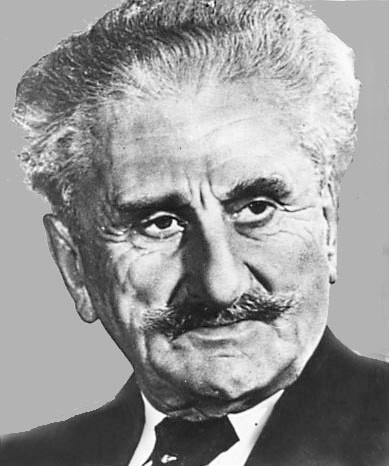Dadiani Shalva

Shalva Dadiani (b. May 21, 1874, Qvirila, present-day Zestaponi – d. March 15, 1959, Tbilisi) was a writer, playwright, actor, publicist, theatre and public figure, People's Artist of Georgia (1923).
He was born into the family of Nikoloz Dadiani, a descendant of the prince of Samegrelo, a famous writer and public figure. Having lost his mother early, Sh. Dadiani was homeschooled by his father and teachers. He was not sent to school, because, according to his father, a Russifying and bureaucratic regime reigned there.
Dadiani's theatrical debut took place in Kutaisi in 1893, he played the episodic role of Count de Giray in the play Marguerite Gautier under the pseudonym “Kuji”. At the Kutaisi Theatre, Dadiani collaborated with V. Aleksi-Meskhishvili, who took him on tour to Tbilisi in 1898. In 1903, Dadiani went to Moscow; Due to the lack of a school education certificate, he was not allowed to enter the university and began his theatrical studies. He wrote reviews of plays, letters on theatrical art and sent them to Georgia. In 1905, he returned to Tbilisi and began working in V. Gunia's troupe. In 1907, he headed the Kutaisi Theatre along with V. Aleksi-Meskhishvili and successfully staged the plays Homeland and When They Were Hunting. In 1908, he created the “Mogzauri Dasi” (Traveling Troupe). The troupe toured all of Georgia, and staged performances in Baku and Novorossiysk as well. During the 30 years of his acting career, Dadiani played approximately 300 roles — Otar Beg and Suleiman-Khan (Betrayal), Shah Abbas (Ketevan the Martyr), Svimon Lionidze (Homeland), Karl Moor (Die Räuber (The Robbers)), the Actor (The Lower Depths) and others.
In 1892, Dadiani published his first collection of poems Napertskali (Spark) under the pseudonym “Kuji”, and in 1896, his first story “Holy Tears” was published in the newspaper “Iveria”. Thus started his literary career. He wrote his first dramatic work, Mghvimeshi (In the Cave) in 1905, and the next —When They Were Hunting, in 1906, which was staged at the Kutaisi Theatre in 1907, but was banned the next day.
Dadiani's prosaic legacy is diverse. At first, he wrote miniatures and short stories on everyday and revolutionary themes. He wrote his first major work The Unfortunate Russian (the title was changed to George the Russian at the order of Soviet censorship), relatively late, in 1916–1924. This work, depicting the era of Queen Tamar, is actually the first historical novel of Georgian writing in the Soviet period. Thanks to his deep understanding of the past and highly artistic imagination, this novel made the author famous. The writer wanted to release a trilogy Menji Robu, a work about Georgia at the turn of the 19th–20th centuries and the era of revolutions. Only the first book of the trilogy, The Gvirgviliani Family, was published in its completed form in 1954. The historical novel Urdumi remained unfinished. The novel was about the uprising of 1857 in Samegrelo. Excerpts were published in the magazine “Mnatobi” (1945–1947).
In the last years of his life, Dadiani wrote memoirs, What I Remembered, it’s chapters were published in the magazine “Tsiskari” (1958–1959), and in 1959, it was completely published as a book. In 1950–1954, two volumes of Dadiani's literary-critical writings were published. He also wrote the screenplay for the film Arsena Jorjiashvili and the libretto for the opera Little Kakhi. He also translated works by W. Shakespeare, F. Schiller, G. Byron, G. Hauptmann and others.
In 1913, the Georgian Drama Society was founded in Batumi under Dadiani’s leadership. He was the first chairman of the Georgian Actors' Union (founded in 1917), permanent member of the Presidium of the Writers' Union, chairman of the Theatre Society (1950–1959).
Dadiani received state awards. He is buried in the Mtatsminda Pantheon of Georgian Writers and Public Figures.
Literary works: პიესები, ტ. 1– 2, ტფ., 1923– 34; რჩეული თხზულებანი, ტ. 1–5, თბ., 1958–62; უბედური რუსი, თბ., 2010.
Literature: ბ უ რ თ ი კ ა შ ვ ი ლ ი ა., შალვა დადიანი, თბ., 1952; ც ი ც ი შ ვ ი ლ ი გ., შალვა დადიანი. ცხოვრება და შემოქმედება, თბ., 1974; შალვა დადიანი და ქართული კინო, თბ., 1974.
Shalva Dadiani, My Autobiography, read by the author:
https://www.youtube.com/watch?v=K0XjyBc_gq0&list=PLue6znsWBAfdUX4MSh1O4SH3xSo-2Brix&index=161
G. Gverdtsiteli


